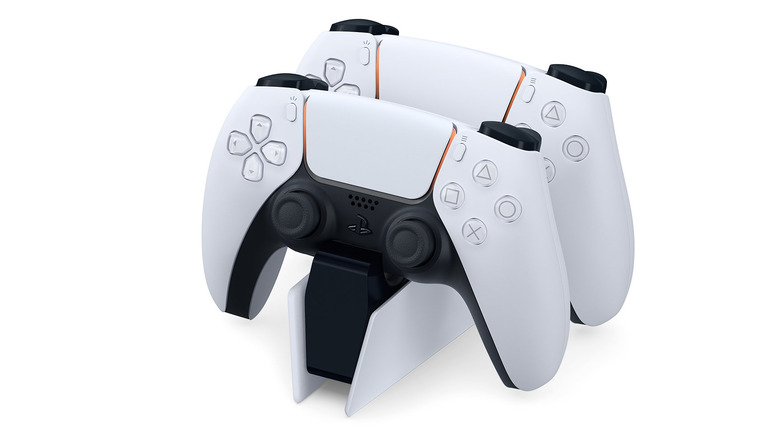The Crucial Reason You Can Turn Off This PS5 Controller Feature
The PlayStation 5's Nov. 12 release date is just around the corner, and fans now know a little more about how the console and, more specifically, its new DualSense controller will function. In a blog post, Sony talked about its accessibility plans for individuals with disabilities, and how the haptic feedback and adaptive trigger features of the DualSense can be turned off or reduced to ensure the controller is usable by everyone.
The introduction of adaptive triggers and haptic feedback have been the two most highlighted features of Sony's DualSense controllers. Increased feedback from these additions increases immersion by providing higher fidelity physical awareness in games. Some examples Sony has provided include variable draw resistance for firing a bow in Horizon Forbidden West, locked triggers after a gun jam in Deathloop, or a feeling imitating spider-sense in Spider-Man: Miles Morales.
This new technology's opportunities have excited gamers and developers alike, but members of the accessibility community have noted that there may be unintended problems with the DualSense. Greg Haynes, a user researcher at AbleGamers, tweeted that adaptive triggers could make the controllers difficult or even dangerous to use for individuals with muscle and joint problems.
Unanticipated feedback, Haynes wrote, "could result in injuries like muscle tears, sprains, general fatigue & more for those with disabilities," adding that he hoped that the feature could be disabled. Other gamers with afflictions such as MSA often have to place a controller on a desk to support it, where any sort of vibration whatsoever causes it to slide out of their grip and make it fundamentally unusable.
Sony has either taken notice of these concerns or anticipated them. The companies announcement reaffirmed its commitment to providing support to gamers with all types of accessibility requirements. Regarding the DualSense controller, the post confirmed that both haptic feedback and adaptive triggers could be reduced or disabled. This confirmation also noted that audio enhancements would also be available to provide alternate spatial awareness.
The PlayStation 5 also has accessibility to features to aid gamers with sight and hearing disabilities. Blind and low vision players will have options for in-game text to be converted to speech. Users who are deaf or hard of hearing can use the same text to speech functions to communicate to party members that were available on the PlayStation 4. A new voice dictation feature will also provide an alternative for gamers who have difficulty using a virtual keyboard to input text.
These features, the announcement noted, will be available in multiple languages, and the custom button assignments and closed captioning features used on the PlayStation 4 are also returning. Also included is a color correction preset that allows users to adjust display colors to best suit their needs, which are then automatically applied to supported games.
Both Sony and its game studios have a strong track record of providing experiences that support accessibility. Disability Horizons, an online accessibility magazine, even went so far as to say that PlayStations developers have created a "gold standard to follow" in championing accessibility in gaming.
One of Sony's most important studios, Naughty Dog, has used some of its highest-profile releases to unveil innovative new accessibility features. Uncharted 4: A Thief's End arrived in 2016 with an option to control the game entirely without the right thumbstick and an option to press and hold buttons instead of rapid button mashing to complete tasks. In 2020, Naughty Dog released the celebrated The Last of Us Part 2, which featured over 60 accessibility options for fine-motor control settings, hearing enhancement, and impaired vision assistance.
However, Sony isn't the only company working towards making gaming a more accessible hobby. In 2018, Microsoft released the Xbox Adaptive Controller, a reprogrammable desktop controller with multiple inputs to allow for a wide range of accessibility. This controller was developed in partnership with AbleGamers, The Cerebral Palsy Foundation, and Warfighters Engaged, and received praise for its innovative approach to accessibility. Like the majority of Xbox One accessories, the Xbox Adaptive Controller will be backward compatible with both the new Series X and Series S consoles when they launch on Nov. 10.
As the videogame community prepares for the arrival of the next generation of consoles, it is encouraging to see industry leaders take point in ensuring accessibility to the 15% of people worldwide who suffer from disabilities. No matter which console comes out ahead this winter, these accessibility options should make these game experiences enjoyable to a larger, more inclusive audience.

